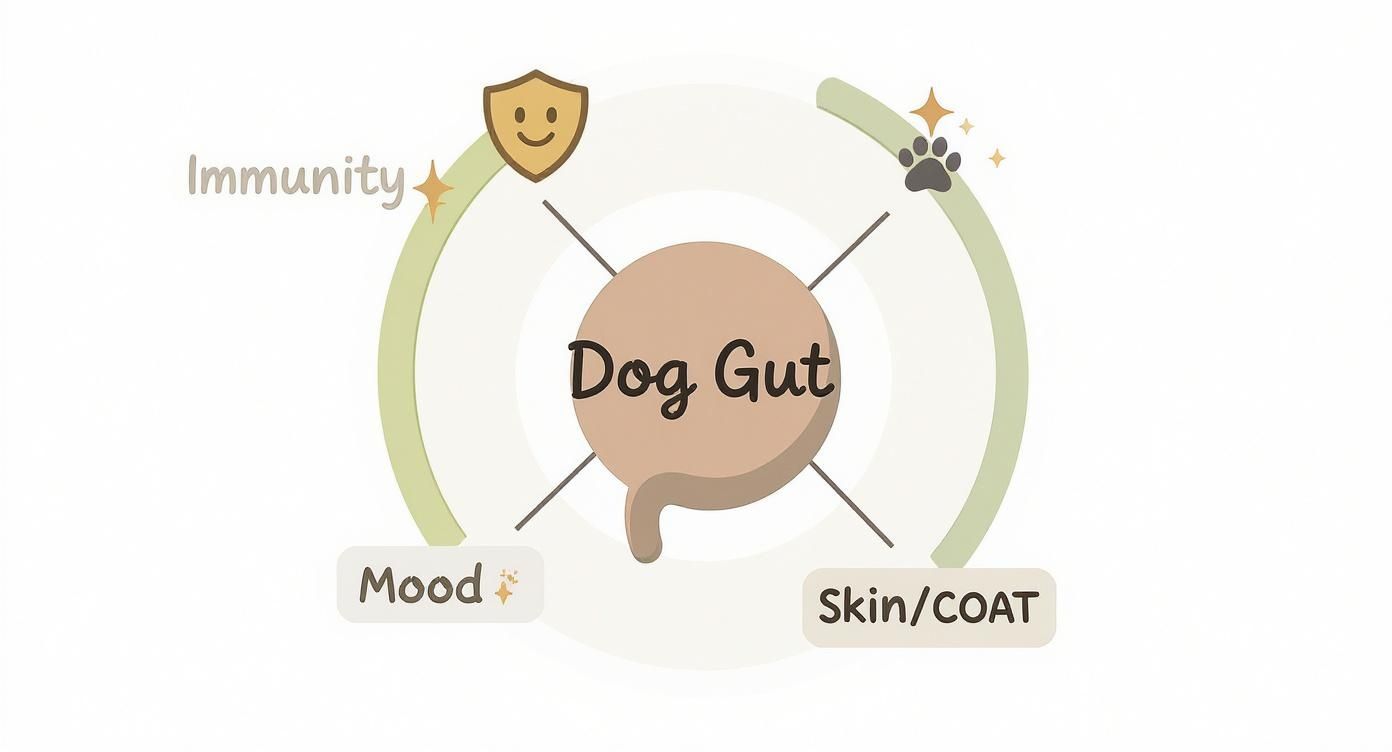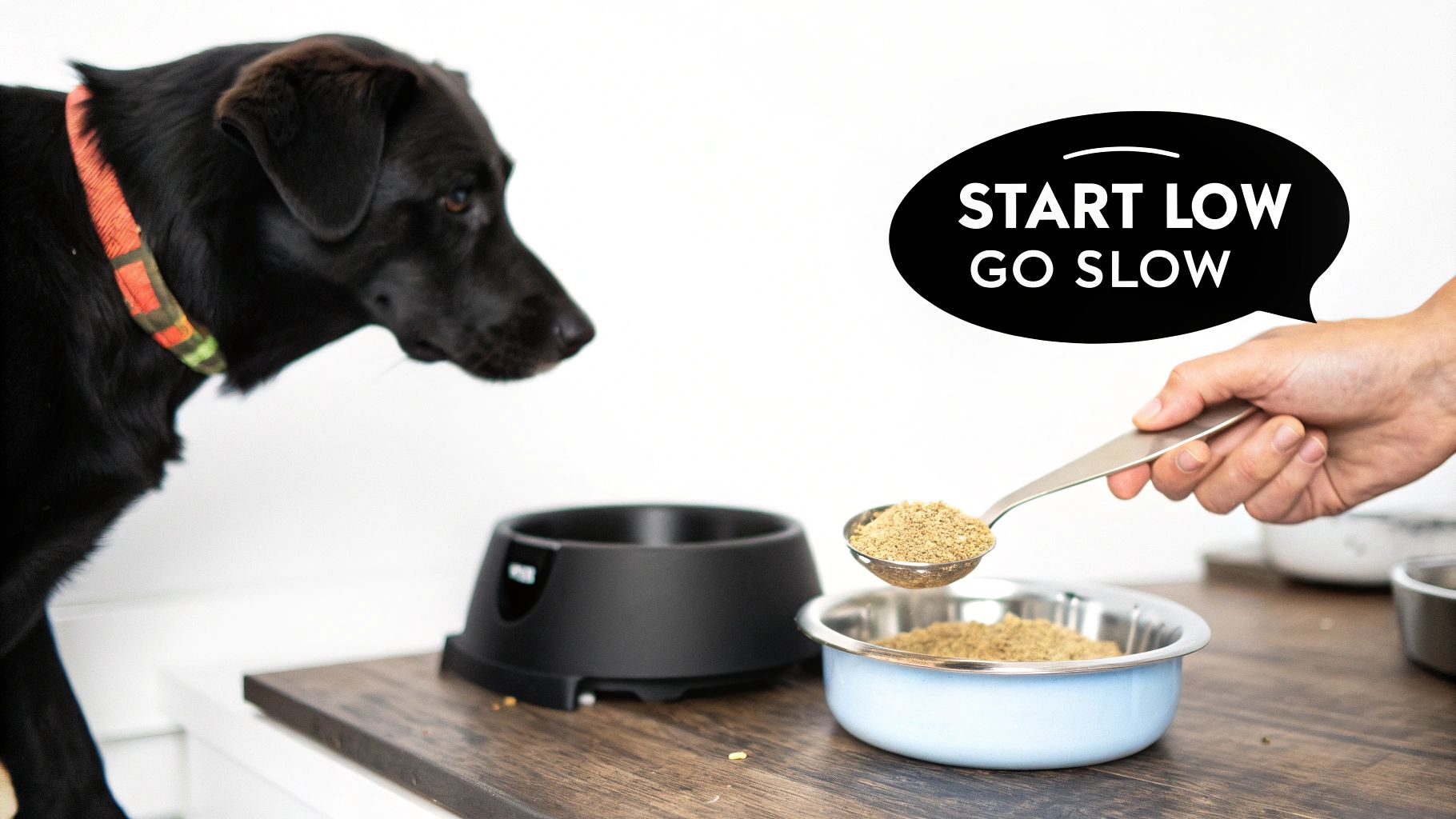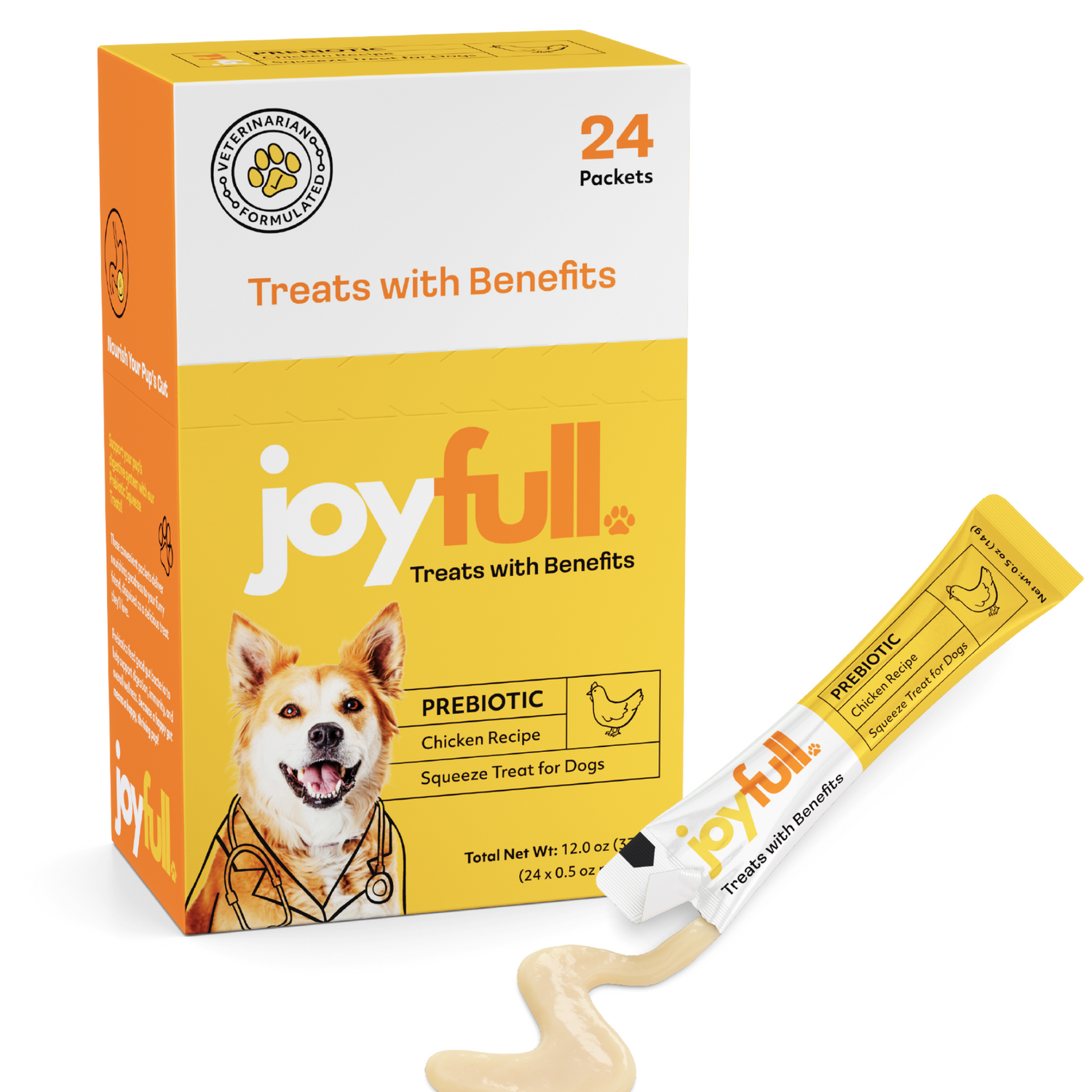
dog digestive supplement: Guide to gut health for dogs
It’s never easy seeing your best friend dealing with an upset stomach—whether it's gas, bloating, or just general discomfort. A dog digestive supplement is simply a product designed to get their gut back on track, much like a daily vitamin helps us fill in our own nutritional gaps. These usually contain a blend of helpful ingredients like probiotics, prebiotics, and enzymes to aid digestion and boost their overall health.
Understanding Your Dog's Digestive Wellness

When your dog has an upset stomach, it's a pretty clear signal that something is out of balance in their digestive system. I like to think of their gut as a complex, finely-tuned engine. When every part is working in harmony, your dog is full of life and energy. But if one component starts to fail—maybe from stress, a new food, or an illness—the whole system can sputter, and you start seeing those tell-tale signs of discomfort.
A good digestive supplement is like a tune-up for that internal engine. It's more than just a quick fix for a bout of diarrhea; it’s a proactive way to maintain a healthy gut environment day in and day out. This helps your dog absorb all the good stuff from their food, which is the foundation for everything from a strong immune system to healthy skin and a shiny coat.
Common Signs of Digestive Distress
Most of us know the classic signs of a tummy ache. But digestive trouble can show up in ways that go beyond the obvious. Learning to spot these clues is the first step in getting your pup the support they need.
Be on the lookout for these common indicators:
- Irregular Stools: This is a big one. It can mean anything from loose, watery diarrhea to hard, dry stools that are a struggle to pass.
- Excessive Gas: A little bit is normal, but if your dog is suddenly clearing the room more often, it could point to poor digestion.
- Vomiting or Regurgitation: Occasional incidents happen, but frequent episodes are a definite red flag.
- Changes in Appetite: A sudden loss of interest in food or, on the flip side, acting ravenous all the time can both be tied to gut health.
A dog’s digestive system is incredibly sensitive to changes in diet and environment. Even minor stress can disrupt the delicate balance of their gut microbiome, leading to common issues like gas and loose stools.
To help connect the dots between what you're seeing and what might help, I've put together a quick reference table. It links common digestive symptoms with the types of supplements that often provide relief. Think of it as a starting point for figuring out what's going on with your dog.
Common Dog Digestive Issues and Supplement Solutions
Here’s a quick-reference guide that links common symptoms to supplements that can offer support.
| Symptom | Potential Cause | Helpful Supplement Type |
|---|---|---|
| Occasional Diarrhea | Diet change, stress, or mild infection | Probiotics, Prebiotics, Kaolin Clay |
| Chronic Gas & Bloating | Poor food breakdown, gut flora imbalance | Digestive Enzymes, Probiotics |
| Constipation | Dehydration, low-fiber diet, inactivity | Fiber (Pumpkin, Psyllium), Probiotics |
| Poor Coat & Skin | Inefficient nutrient absorption | Probiotics, Digestive Enzymes |
| After Antibiotics | Disruption of "good" bacteria | Probiotics and Prebiotics (Synbiotics) |
Remember, this chart is a guide, not a diagnosis. If your dog's symptoms are severe or persist, your first call should always be to your veterinarian.
Why Gut Health Is Your Dog's Wellness Engine
It's easy to think of your dog's gut as just a simple tube for processing food, but that’s like only seeing the tip of an iceberg. In reality, a healthy gut is the command center for their entire body, influencing everything from their immune system to their mood. There's a powerful gut-brain connection, which is why you'll often hear experts call the gut the "second brain."
When this internal ecosystem is in balance, you see the benefits everywhere. A strong digestive system doesn't just prevent the occasional upset stomach; it makes sure your dog is wringing every last drop of nutrition from their food. Proper nutrient absorption is the bedrock of a happy, energetic dog.
The Microbiome: A Bustling Inner City
To really get a handle on gut health, you have to understand the gut microbiome. Picture your dog's intestines as a sprawling, microscopic city. This city is home to trillions of residents—bacteria, fungi, and other tiny organisms, some helpful and some not so helpful.
In a healthy gut, the "good bacteria" are the model citizens. They're hard at work:
- Breaking down food into energy your dog can actually use.
- Producing vital nutrients like vitamins B12 and K.
- Keeping the gut wall strong to block out harmful intruders.
- Training the immune system to tell friend from foe.
When this city is running smoothly, your dog is thriving. But things like stress, a poor diet, or a round of antibiotics can throw everything into chaos, letting the "bad bacteria" run rampant and cause trouble.
Adding a quality dog digestive supplement is like sending in reinforcements for the good guys. It helps restore order and keeps the city running efficiently, which has a direct and positive impact on your dog's overall well-being.
A dog’s gut is home to roughly 70% of their immune system. A balanced microbiome acts as the first line of defense, shielding them from pathogens and keeping inflammation in check.
Beyond Digestion: The Health Benefits of a Happy Gut
The ripple effects of a balanced gut go way beyond just preventing gas or diarrhea. When your dog's internal city is firing on all cylinders, you'll start to see noticeable improvements in other areas of their health, too.
A strong microbiome is directly tied to a more resilient immune response, meaning your dog can better fight off common bugs. It also plays a key part in managing inflammation throughout the body. On top of that, a healthy gut can contribute to a calmer mind, sometimes even helping to ease anxiety-related behaviors. You might even notice their coat getting shinier and their skin looking healthier, all because they're finally absorbing the nutrients they need.
It's no surprise that as pet owners learn more about this, the demand for quality canine supplements has skyrocketed. The global pet supplements market was valued at USD 2.26 billion and is expected to hit USD 3.19 billion by 2030, with dog products leading the way. This boom shows just how many of us are realizing that proactive gut support is a smart investment in our pets' long-term health.
Of course, supplements can't do it all on their own. They work best alongside a great diet. Making sure you’re feeding the best dog food for digestive health is a massive piece of the puzzle. When you combine a balanced diet with targeted supplements, you're creating a powerful one-two punch for keeping your best friend in peak condition.
Decoding Ingredients in a Dog Digestive Supplement
Reading the ingredient label on a dog digestive supplement shouldn't feel like a chemistry test. Honestly, it can be overwhelming. But think of yourself as a detective, piecing together the clues to unlock your dog's best gut health. My goal here is to help you become a confident, informed pet parent by breaking down what really matters inside that container.
We'll skip the jargon and use some simple analogies to make these ingredients click. By the end, you'll know exactly how to choose a product based on what's inside—not just the flashy marketing on the outside.
The Core Trio: Probiotics, Prebiotics, and Enzymes
Most top-notch digestive supplements are built around a core team of three power players. While they often work together, each has a distinct and vital role. Think of them as a well-oiled pit crew for your dog's digestive engine.
First up, you have probiotics. These are the friendly troops on the front lines—live, beneficial bacteria that help defend the gut from bad bugs, keep things in balance, and even support the immune system. When your dog's gut gets out of whack, probiotics are the reinforcements you send in to restore order. If you want to dive deeper into specific strains, our guide on the best probiotics for dogs is a great resource.
Next, we have prebiotics. If probiotics are the soldiers, then prebiotics are their MREs (Meals, Ready-to-Eat). Prebiotics are specific types of dietary fibers that your dog can't digest but are the perfect food for those good gut bacteria. Adding them to the mix ensures your probiotic troops have the fuel they need to thrive and multiply.
Finally, there are digestive enzymes. These are the efficiency experts of the digestive system. Enzymes like amylase, protease, and lipase get to work breaking down complex carbs, proteins, and fats into smaller, more absorbable nutrients. For some dogs, especially those with conditions like Exocrine Pancreatic Insufficiency (EPI), enzymes are absolutely essential for unlocking the full nutritional value of their meals.
A truly complete dog digestive supplement often combines all three. This synergistic approach, sometimes called a synbiotic formula, ensures you're not just adding good bacteria but also feeding them and helping the entire digestive process run more smoothly.
Powerful Supporting Ingredients
Beyond that core trio, many great formulas include other natural ingredients known for their digestive benefits. These supporting players can provide targeted relief and extra gut-soothing power.
- Pumpkin: This is a fantastic source of soluble fiber and a go-to for regulating bowel movements. It can add bulk to firm up loose stools or help soften hard ones, making it a super versatile tool for both diarrhea and constipation.
- Ginger: Well-known for its anti-nausea properties, ginger is a wonderful stomach soother that can help reduce vomiting. It also has natural anti-inflammatory effects that can calm an irritated GI tract.
- Brewer's Yeast: This ingredient is a powerhouse of B-vitamins, which are crucial for metabolism and energy. As you get better at decoding supplement labels, you'll appreciate how ingredients like Brewer's Yeast for dogs contribute to their overall health.
- Chamomile: Just like it helps calm us down with a cup of tea, chamomile can have a soothing effect on a dog's gut. Its properties can help reduce the muscle spasms and cramping that often come with digestive upset.
This concept map really helps visualize how a healthy gut, supported by these ingredients, acts as the foundation for your dog's overall wellness.

As you can see, gut health is absolutely central to their immunity, mood, and even the condition of their skin and coat. It all starts in the belly.
A Quick Look at the Key Ingredients
To make it even easier to compare supplements, here's a simple breakdown of the most common ingredients you'll find and what they do.
Key Ingredients in Dog Digestive Supplements and Their Functions
| Ingredient | Primary Function | Best For |
|---|---|---|
| Probiotics | Introduces beneficial bacteria to the gut | General gut maintenance, diarrhea, post-antibiotic recovery |
| Prebiotics | Feeds the good bacteria already in the gut | Supporting probiotic effectiveness, long-term gut balance |
| Digestive Enzymes | Breaks down food into absorbable nutrients | Dogs with poor digestion, gas, bloating, EPI |
| Pumpkin | Regulates bowel movements (firms or softens stool) | Diarrhea, constipation, sensitive stomachs |
| Ginger | Soothes nausea and stomach upset | Vomiting, car sickness, general indigestion |
| Brewer's Yeast | Provides essential B-vitamins for metabolism | Overall wellness, skin & coat health support |
| Chamomile | Calms the GI tract and reduces muscle spasms | Anxious dogs with upset stomachs, cramping |
This table can be your cheat sheet when you're standing in the pet aisle, trying to figure out which formula is the right fit. It all comes down to what your specific dog needs.
Choosing the right dog digestive supplement means looking for a formula with ingredients that target your pet's specific issues, whether it's general maintenance or tackling pesky gas and bloating. When you know what these ingredients do, you're empowered to make the best choice for your furry friend.
How to Choose the Right Supplement for Your Dog
Walking down the supplement aisle can feel a bit overwhelming, can't it? With so many bottles and promises, it’s tough to know where to start. But finding the perfect dog digestive supplement isn’t about grabbing the first thing you see. It’s about being a bit of a health detective for your furry best friend.
Your mission is to find a product whose ingredients and form are the right match for your dog’s specific symptoms, their age, and even their picky eating habits. Let's break down how to do that so you can choose with confidence.
Assess Your Dog’s Specific Needs
First things first, take a step back and just observe your dog. What are you actually seeing? A dog who gets the runs when he's stressed out from a vet visit needs something different than a senior pup who isn't getting all the nutrients from her food anymore.
Start by asking yourself a few simple questions:
- What's the main problem? Is it smelly gas, loose stools, constipation, or maybe they just seem sluggish and uncomfortable after eating? Nailing down the primary symptom helps you focus on ingredients that can offer real relief.
- Is this a new issue or has it been going on for a while? A sudden bout of diarrhea might just need a short-term probiotic boost. A chronic issue, on the other hand, could mean they need ongoing support from digestive enzymes or a more complete formula.
- How old is your dog and what's their breed? Puppies are still building their digestive systems, while older dogs often need a little extra help breaking down food. Some breeds, like German Shepherds, are known for conditions like Exocrine Pancreatic Insufficiency (EPI) and can do really well with enzyme-heavy supplements.
Picking a supplement is never a one-size-fits-all deal. What works wonders for your neighbor’s Golden Retriever might not be the right fit for your little Chihuahua. A personal approach based on what you see is always the best way to go.
Compare Different Supplement Forms
A dog digestive supplement is completely useless if your dog won't take it. Fortunately, they come in a few different forms, so you can pick one that works for both of you.
- Chews: These are the crowd-pleasers. Often flavored like a treat, they make supplement time feel like a reward. They're super easy to dose, but always flip the bag over and check the inactive ingredients for potential allergens or unnecessary fillers.
- Powders: Incredibly versatile, powders mix right into wet or dry food, making them a fantastic choice for suspicious pups who might spit out a chew. You can also adjust the dose with much more precision, and powders are often a more stable way to deliver live probiotics.
- Liquids: Another easy option, liquid supplements can be mixed into food or even water. The body absorbs them quickly, but they can sometimes have a shorter shelf life after you open the bottle.
For a deeper dive into gut health in general, this a guide to the best gut health supplements is a really helpful resource.
Evaluate Brand Reputation and Quality
Okay, you’ve got a type of supplement and a form in mind. Now it's time to look at the brand itself. All supplements are not created equal, and good quality control is absolutely essential for your dog's safety. A trustworthy company will be open and honest about how they make their products.
Here's a quick checklist to help you size up a brand:
- Look for Third-Party Testing: Scan the label for a seal from an organization like the National Animal Supplement Council (NASC). This seal means the product has passed independent audits for quality and safety.
- Read the Entire Label: Don't just glance at the active ingredients. Check the "inactive" list for things like soy, corn, or artificial flavors that might bother a sensitive stomach.
- Check Out Reviews: See what other dog owners are saying. While every dog is different, consistent comments in reviews can give you a good sense of a product's effectiveness and whether or not dogs actually like the taste.
- Talk to Your Vet: This is your best resource, period. Your veterinarian can give you a recommendation based on your dog's specific health history and make sure a new supplement won't interfere with any current medications.
By following these steps, you go from being a confused shopper to an empowered pet parent, ready to make a great choice for your dog's gut health.
Introducing Supplements Safely and Effectively

How you introduce a new dog digestive supplement is just as crucial as which one you pick. Even the best products can throw a dog's system for a loop if introduced too quickly. The secret is a slow, patient approach that gives their body time to adjust and welcome the new support.
Think of it like easing into a new workout plan. You wouldn't try to lift your max weight on day one; you start small and build up. We want to do the same for our dogs to avoid any temporary tummy troubles and set them up for long-term success.
The Start Low and Go Slow Method
The golden rule for adding anything new to your dog's diet is to start low and go slow. This is, hands down, the safest way to see how your dog's body will react. Forget about giving the full recommended dose right away—we're going to start with just a fraction of it.
For the first few days, try just a quarter or even half of the suggested serving size. This tiny initial dose lets their gut microbiome get familiar with the new ingredients, like probiotics and enzymes, without feeling overwhelmed. It's a simple step that drastically reduces the risk of side effects like gas or loose stool.
A gradual introduction isn't just about preventing an upset stomach. It's about building a positive experience, so your dog sees the supplement as a normal, even welcome, part of their mealtime routine.
If everything looks good after three to five days, you can bump up the dose a little. Continue this gradual increase every few days until you've reached the full recommended amount for your dog's size. This careful ramp-up is the same principle vets recommend when switching foods, a process you can learn more about in our guide on how to transition dog to new food.
Finding the Right Dosage and Timing
Figuring out the correct dose is simple but non-negotiable. Always, always follow the guidelines on the product label. These are typically based on your dog's body weight for a reason—giving too little won't deliver the benefits, and giving too much is a waste that could cause digestive upset.
So, when is the best time to give it? For most digestive aids, mixing it right into their food is the way to go. This ensures the supplement is in the stomach when the digestive process kicks into high gear, helping the enzymes break down food and allowing the probiotics to get to work where they're needed most.
Monitoring Your Dog's Progress
Once you’ve started the new routine, it's time to become a bit of a detective. The positive changes can be subtle at first, but they're clear signs that the supplement is doing its job.
Keep an eye out for these tell-tale signs of success:
- Better Stool Quality: This is often the first thing owners notice. Look for firmer, more consistent, and less smelly poops.
- Reduced Gas: A noticeable decrease in flatulence and those gurgling belly sounds is a great sign.
- Improved Appetite and Energy: Your dog might seem more excited for their meals and have a little more bounce in their step.
- Healthier Skin and Coat: As nutrient absorption improves, you may see a shinier coat and less flaky skin over a few weeks.
Patience is key here. While some dogs show improvement in just a few days, it can often take four to six weeks to see the full benefits, especially when it comes to rebalancing the gut microbiome. Stick with it! If you see any persistent or severe negative reactions, stop giving the supplement and give your vet a call.
Got Questions? We’ve Got Answers
Even after diving into the world of gut health, you probably still have a few questions. That’s perfectly normal. Let's tackle some of the most common things pet parents ask, with clear, vet-backed answers to help you feel confident.
Can I Just Give My Dog a Human Probiotic?
This is a big one, and the answer is a hard no. Think of your dog’s gut as its own unique ecosystem. It has different pH levels and is home to specific strains of bacteria that are very different from ours. A probiotic made for a human just isn't designed for that environment and won’t do much good.
Even more critically, some human supplements contain ingredients that are dangerous for dogs. A common one is xylitol, an artificial sweetener that’s extremely toxic to them, even in tiny amounts. The bottom line? Always stick to products formulated specifically for canines.
How Long Until I See a Difference?
This is where patience and consistency really pay off. For a quick, minor upset—say, a bout of stress-induced diarrhea—you might notice things getting back to normal within just a few days. The good bacteria can get to work pretty quickly to calm things down.
But for more chronic issues or the bigger goal of building a robust, balanced gut, you’re playing the long game. It often takes a solid four to six weeks of daily use to see the full, lasting benefits. Don't get discouraged if you don't see a dramatic change right away; give it time to work its magic.
It's a lot like starting a new fitness routine—you don't build muscle overnight. Improving gut health takes consistent, daily support to allow the good bacteria to take hold and create a stronger, more resilient digestive system.
Are There Any Side Effects I Should Look Out For?
For the most part, dogs tolerate a high-quality dog digestive supplement really well. That said, when you first introduce something new, their system might need a moment to adjust.
It’s not uncommon to see some mild, temporary changes, like:
- A bit more gas or bloating than usual
- Stools that are a little softer for a day or two
This is typically just an initial adjustment phase and should clear up within a few days, especially if you follow the "start low and go slow" approach. However, if you see anything more serious—like vomiting, ongoing diarrhea, or signs of an allergy like hives or intense itching—stop the supplement and give your vet a call right away.
Does My Dog Need a Supplement Every Single Day?
Honestly, it really depends on your specific dog. For many pups, daily support is a game-changer. This is especially true for senior dogs, breeds known for tummy troubles, or any dog with a history of a sensitive stomach. A daily dose helps maintain that healthy balance and can prevent future flare-ups.
On the other hand, some dogs might only need them in certain situations. You might use one to get through a stressful event like a long car ride, to help their gut recover after a round of antibiotics, or to smooth the transition to a new food. Your vet is the best person to help you figure out the perfect plan for your four-legged friend.
At Joyfull, we believe your pet deserves nothing but the best. Our formulas are built on clean ingredients and backed by veterinary science to help them live a happy, vibrant life.
Ready to give your dog’s digestive health a boost? Explore our supplements at Joyfullpet.com

